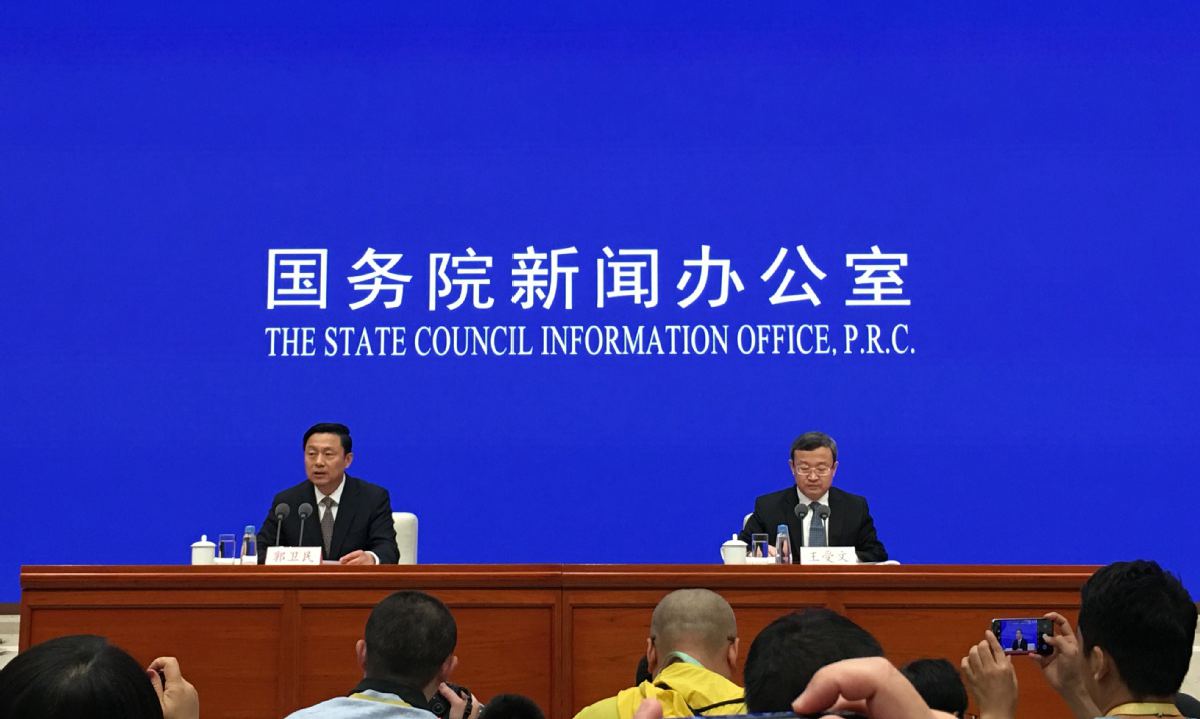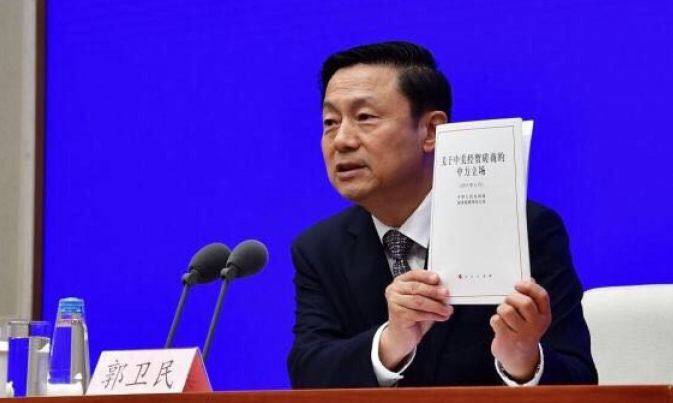https://youtu.be/DjMI0mLUuYI
https://youtu.be/uEAc3PYe1W0
https://youtu.be/UABkYYyPMzc
https://youtu.be/uEAc3PYe1W0
https://youtu.be/UABkYYyPMzc
 |
| China releases white paper on its position on economic and trade consultations with U.S. |
On Sunday, China released a comprehensive white paper to formalize its positions on trade negotiations with the U.S. The set of statements come as the trade war escalates and Beijing threatens to hit back with a retaliatory blacklist of U.S. firms. Here are some key takeaways from the press conference announcing the white paper:
U.S. ‘responsible’ for stalled trade talks
The “U.S. government bears responsibility” for setbacks in trade talks, chided the paper, adding that the U.S. has imposed additional tariffs on Chinese goods that impede economic cooperation between the two countries and globally.
While it’s “common” for both sides to propose “adjustments to the text and language” in ongoing negotiations, the U.S. administration “kept changing its demands” in the “previous more than ten rounds of negotiations,” the paper alleged.
On the other hand, reports of China backtracking on previous trade deals are mere “mudslinging,” Wang Shouwen, the Chinese vice minister of commerce and deputy China international trade representative, said as he led the Sunday presser.
China ready to fight if forced to
China does not want a trade war with the U.S, but it’s not afraid of one and will fight one if necessary, said the white paper.
Beijing’s position on trade talks has never changed — that cooperation serves the interests of both countries and conflict can only hurt both — according to the paper. CNBC’s Eunice Yoon pointed out that Beijing’s latest stance repeats previous statements made back in September.
#China white paper highlights out on state media. My take on msg so far:
-China is the grown-up
-China is the victim
-China wants talks but only as an equal
-China will fight US for as long as it takes
(Not too diff from Sep 2018 white paper same topic) https://t.co/A5LCw3kZVL
— Eunice Yoon (@onlyyoontv) June 2, 2019 Eunice YoonVerified account @onlyyoontvDeals must be equal
#China white paper highlights out on state media. My take on msg so far: -China is the grown-up -China is the victim -China wants talks but only as an equal -China will fight US for as long as it takes (Not too diff from Sep 2018 white paper same topic) http://www.xinhuanet.com/english/2019-06/02/c_138110190.htm …
Difference and frictions remain on the economic and trade fronts between the two countries, but China is willing to work with the U.S. to reach a “mutually beneficial and win-win agreement,” stated the paper. However, cooperation has to be based on principles and must not compromise China’s core interests.
“Nothing is agreed until everything is agreed,” Wang said.
He said one needs not “overinterpret” China’s soon-to-come entity list, adding that it mainly targets foreign companies that run against market rules and violate the spirit of contracts, cut off supplies to Chinese firms for uncommercial reasons, damage the legitimate rights of Chinese companies, or threaten China’s national security and public interests.
China respects IP rights
The paper also touched on issues that are at the center of the prolonged U.S.-China trade dispute, including China’s dealings with intellectual property rights. U.S. allegations of China over IP theft are “an unfounded fabrication,” said the white paper, adding that China has made great efforts in recent years to protect and enforce IP rights.
Wang claimed that China pays the U.S. a significant sum to license IP rights every year. Of the $35.6 billion it shelled out for IP fees in 2018, nearly a quarter went to the U.S.
Investments are mutually beneficial
The white paper claimed that bilateral investments between the two countries are mutually beneficial rather than undermining for U.S. interests when taken account of “trade in goods and services as well as two-way investment.”
The Chinese government also pushed back at claims that it exerts influence on businesses’ overseas investments.
“The government is not involved in companies’ business activities and does not ask them to make specific investments or acquisitions,” said Wang. “Even if we make such requests, companies won’t obey.”
In response to China’s probe into FedEx over Huawei packages that went stray, Wang assured that “foreign businesses are welcome to operate legally in China, but when they break rules, they have to cooperate with regulatory investigations. That’s indisputable.”
The Shenzhen-based smartphone and telecom giant has been hit hard by during the trade negotiations as the Trump administration orders U.S. businesses to sever ties with the Chinese firm.
Source link to /techcrunch
Read more:
Investigation into FedEx expected to be fair and just
Chinese authorities announced on Saturday that relevant department has decided to open an investigation into whether FedEx violated the legitimate rights and interests of its Chinese clients. Huawei recently revealed to the media that FedEx had diverted two parcels sent from Japan destined for an address in China to the US, and two others from Vietnam to Hong Kong and Singapore respectively were also diverted to a US address after delay.Source: Global Times | 2019/6/1 23:36:25
China's entity list sends clear signal
China's Ministry of Commerce announced on Friday that the country will release its non-reliable entity list. Foreign entities, individuals and companies that block and shut the supply chain, or take discriminatory measures over non-commercial reasons, and when their actions endanger the business of Chinese companies will be included in the list.Source: Global Times | 2019/5/31 20:09:26
US ambitions threaten Asian security
The annual Shangri-La Dialogue kicked off in Singapore Friday. Chinese Defense Minister Wei Fenghe and Acting US Defense Secretary Patrick Shanahan will attend the event and make a speech, raising observers' expectations on this year's Dialogue. China does not want but is not afraid of a trade war: white paper
China does not want but is not afraid of a trade war: white paper
China
does not want a trade war, but it is not afraid of one and it will
fight one if necessary. China's position on this has never changed, the
white paper pointed out.
 US accusation of China IP theft, forced technology transfer unfounded: white paper
US accusation of China IP theft, forced technology transfer unfounded: white paper
Accusing China of stealing intellectual property to support its own development is an unfounded fabrication.























